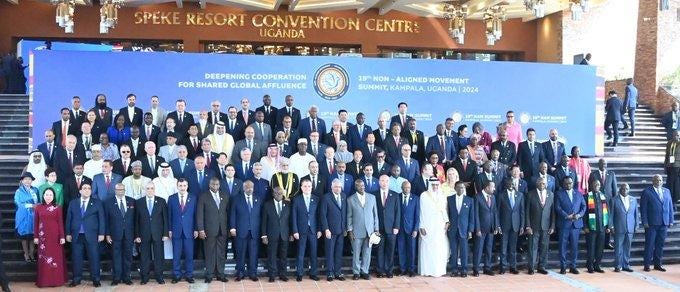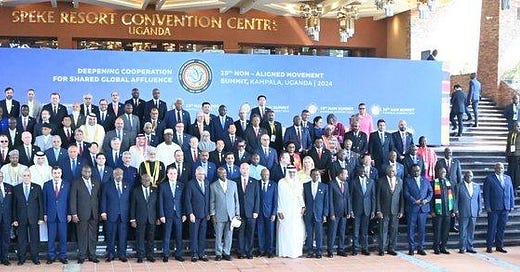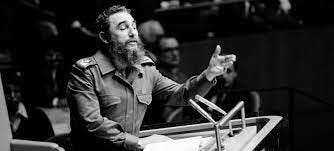The Bandung Spirit
The Bandung Conference, the first large-scale Asian-African Conference, was held from April 18 to April 24, 1955, seventy years ago, in Bandung, Indonesia. The conference was organized by Indonesian President Sukarno, with Indian Prime Minister Jawaharlal Nehru also playing a key role. Nasser of Egypt and Zhou Enlai of China were among the participants. Delegates from twenty-nine newly independent Asian and African nations, representing 54% of the world’s population, participated. US Congressmen Adam Clayton Powell Jr. and black American novelist and writer Richard Wright attended through the sponsorship, respectively, of Ebony and Jet magazines and the Congress for Cultural Freedom.
The Bandung conference declared the importance of Third World unity in opposition to European colonialism and Western imperialism. It advocated economic cooperation rather than exploitation as the basis for international relations. Seeking to end the assigned role of their economies as exporters of raw materials and importers of manufactured goods, the Bandung conference called for the diversification of their economies and the development of their national industries. It supported the regulation of international capital flows. It advocated international control of arms, the reduction of military forces, and the prohibition of nuclear arms. It denounced cultural imperialism and the suppression of national cultures.
A dossier published on April 8, 2025, by Tricontinental: Institute for Social Research writes that the Bandung Conference was “one of the high points in the process of decolonisation.” During the Conference, its secretary-general Roeslan Abdulgani began to speak of a “Bandung Spirit,” a spirit for peace, against violence and discrimination, and for the common economic development of all, without unjustifiable interference in the internal affairs of independent states.

The success of the Bandung Conference and the birth of the Bandung Spirit inspired the establishment in 1961 of the Non-Aligned Movement (NAM), led by Yugoslav President Josip Tito along with Nasser, Nehru, and Sukarno. Kwame Nkrumah, Prime Minister of Ghana, and Osvaldo Dorticós, President of Cuba in representation of the Cuban Revolution, also were present. The Founding Summit called for the democratization of the United Nations, and it called upon the nuclear powers—which at that time were the USA, the Soviet Union, Great Britain and France—to eliminate their nuclear arsenals. Moreover, it declared support for the armed struggles of national liberation movements in Algeria and the Portuguese colonies in Africa.
In 1973, at its Third Summit in Algiers, the Non-Aligned Movement declared that the international order continues to promote the underdevelopment of Third World nations. The Summit supported the creation of public cartels in order to empower raw materials exporters. Responding to the deteriorating terms of trade for the Third World, it called for a linking of the prices of raw materials exports to the prices of imported manufactured goods. And the Summit affirmed the principle of the sovereignty of nations over their natural resources, including their right to nationalize properties within their territories. The Summit endorsed a document on the New International Economic Order, which had been in preparation by Third World governments for a decade.
In 1974, the UN General Assembly adopted the document on a New International Economic Order, which, in addition to the backing of the Non-Aligned Movement, was supported by the G-77 and the socialist governments of Eastern Europe. The document affirmed the principle of the sovereignty of nations over their natural resources. It advocated: the creation of raw materials producers’ associations to give raw materials exporting states control over prices; a new international monetary policy that did not punish weaker states; increased industrialization of the Third World; the transfer of technology from the advanced industrial nations to the Third World; regulation and control of the activities of transnational corporations; the promotion of cooperation among the nations of the Third World; and aid for Third World development.
In 1979, at the Sixth Summit of the Non-Aligned Movement in Havana, ninety-three countries of the Third World reaffirmed their commitment to national sovereignty, economic integrity, cultural diversity, and nuclear disarmament. They declared: “The Chiefs of State and Government reaffirm their deep conviction that a lasting solution to the problems of countries in development can be attained only by means of a constant and fundamental restructuring of international economic relations through the establishment of a New International Economic Order.”
Cuba, representing the Non-Aligned Movement as its President from 1979 to 1982, called upon the United Nations to respond to the desperate economic and social situation of the Third World. It proposed: an additional flow of resources to the Third World through donations and long-term low-interest credit; an end to unequal terms of trade; the cessation of irrational arms spending, directing these funds to finance development; a transformation of the international monetary system; and the cancellation of the debts of less developed countries in a disadvantageous situation.
The Non-Aligned Movement is derailed from within
By the late 1970s, the Non-Aligned Movement had lost its influence in the world. The governments were trapped in what Nkrumah called an “economic stranglehold,” and as a result, the movements of Third World national liberation had been unable to deliver on their promises to their peoples. Sukarno had been removed from power, as had Nkrumah. Nasser had lost influence as a result of Egypt’s defeat in the 1967 war. The Non-Aligned Movement proposal for a New International Economic Order was ignored by the global powers. Confronting the first signs of the sustained structural crisis of the world-system, the global powers were gearing up for a decisive move in a direction opposite to that proposed by the Non-Aligned Movement, toward a reduction of the role of the state in the economy, which meant a decline in the capacity of Third World governments to defend their sovereignty, their natural resources, and the human rights of their peoples.
Since the beginning of the emergence of Third World anti-colonial movements, there was a sector of the Third World national bourgeoisie that had an economic interest and an ideological orientation to develop national independence in a form that preserved the economic structures established during the colonial period. This sector included, for example, those members of the national bourgeoisie who owned enterprises dedicated to the exportation of raw materials or the importation of manufacturing goods. In addition, significant numbers of the national bourgeoisie had been educated in Western institutions, facilitating the dissemination of ideas that justified the established world-system.
Thus, in reflecting on the Third World project, we consistently have to maintain a distinction between accommodationists and revolutionary leaders/intellectuals of the Third World. During the transition to independence and the subsequent evolution of the neocolonial world-system, the global powers continually gave support to accommodationists and attempted to undermine or assassinate revolutionary leaders. Many newly independent Third World governments tried to maintain a balance, making concessions to revolutionary aspirations and popular demands, but maintaining friendly relations with the global powers. Some political leaders adopted the balancing act out of genuine concern for the people and the nation, but others became skilled at cynically presenting themselves as defenders of the people as they protected the interests of the national bourgeoisie.
The 1979-1980 ideological turn to the Right by the global power elite provided the opportunity for Third World accommodationists to take advantage of the weakened international position of the revolutionary leaders and to derail the radical Third World project. At the 1983 Summit of the Non-Aligned Movement in New Delhi, accommodationists gained the upper hand, led by Sinnathamby Rajaratnam, Minister of Foreign Affairs of Singapore. Rajaratnam maintained that the world had entered a “systemic crisis” in the 1970s, and as a result, each Third World nation needed to be motivated primarily by national interest. The best policy, he maintained, is the elimination of state-directed development and the reduction of the role of the state to that of protecting people from extreme inequalities by redistributing income, but “without deadening competitive spirit.”
Rajaratnam spoke on behalf of a Third World national industrial bourgeoisie that had been born after colonialism and the anti-colonial movements. The members of this class had benefitted from the protective measures of the national liberation state, but they now experienced the structures that had enabled them to flourish as shackles. They formed a self-confident class that was emboldened to defend its particular interests rather than the interests of the people as a whole. They envisioned the development of new information technology in the Third World, through their expertise and entrepreneurship, thus taking advantage of opportunities provided by the technological development of the world-economy. They rejected the radical Third World project and adopted an anti-Soviet, pro-USA stance. Many of the accommodationists to neoliberalism had been socialized in international organizations, such as the IMF and the World Bank, or in transnational corporations. And they were especially well represented by the national bourgeoisies from the better-off Third World nations, such as the “Asian Tigers.”
Fidel addressed the 1983 New Delhi Summit in his capacity as outgoing president of the Movement. Standing against accommodation, Fidel powerfully defended the historic project of the Non-Aligned Movement. His speech, “The World Economic and Social Crisis,” was enthusiastically and emotionally received by the delegates, many of whom felt attachment to the historic Third World agenda, even as the world political and economic situation and the political conditions in their own countries compelled them to adapt.
§
The Bandung Spirit is born again
I submit that the Third World project never died, inasmuch as it remained alive in the hopes of the peoples of the world, which is difficult for Western intellectuals to see, because of the pervasive materialism and cynicism of the West at the present time.
Renewal of the Bandung Spirit and revitalization of the Third World project of the Non-Aligned Movement began in the late 1990s. It was rooted in rejection of the neoliberal project by the peoples, who experienced the negative consequences of neoliberal policies, such as: the devaluation of their currencies; increases in the costs of water, electricity, natural gas, and buses; reduction in government programs and services; the undermining of local agricultural production; and higher levels of unemployment, crime and violence. Drawing upon decades of anti-colonial and anti-imperialist movements, leaders emerged who were able to reformulate the specific grievances and concrete demands of the people into a broader political and social critique of neoliberalism, and in some cases, critiques of imperialist policies and the neocolonial world-system. Thus, there emerged a popular movement across Latin America, the Movement for an Alternative World, proclaiming that “A Better World is Possible.”
The Alternative World Movement spawned new political parties that sought to take power away from the traditional political parties that had cooperated with the global powers and transnational corporations in the imposition of the neoliberal project. The new parties were able to win presidential and/or parliamentary elections in a number of Latin American countries, including Venezuela, Bolivia, Ecuador, Brazil, Argentina, Uruguay, Nicaragua, El Salvador, and Paraguay. In addition, leftist and progressive governments played a leading role in developing regional organizations of economic, political, and cultural cooperation, challenging US imperialist policies and seeking to develop alternatives to the structures of the neocolonial world-system. The leaders of four of these nations (Venezuela, Bolivia, Ecuador, and Nicaragua) proclaimed that they were seeking to build “Socialism for the Twenty-First Century,” and leaders from throughout the region affirmed their admiration for Cuba as a “model of Latin American dignity.”
The new Latin American political reality impacted the Non-Aligned Movement, which was evident by 2006, when Cuba assumed the presidency of the Movement for the second time. In the proceedings in Havana, speaker after speaker—that is, President after Prime Minister after Foreign Secretary—took to the podium to denounce neoliberalism and the unjust international economic order, in a powerful and emotional public display that lasted all through the night, as the orators ignored the persistent appeals by moderator Raúl Castro to be more brief in their elocution.
The Non-Aligned Movement’s 2006 Declaration of Havana, endorsed unanimously by the 118 member nations, speaking in the name of three-quarters of humanity, called for a “more just and equal world order;” and it lamented “the excessive influence of the rich and powerful nations in the determination of the nature and the direction of international relations.” It rejected the neoliberal project as promoting global inequality and “increasing the marginalization of countries in development.” It affirmed the principles of the UN Charter, including the equality and sovereignty of nations, non-intervention in the affairs of other states, and “the free determination of the peoples in their struggle against foreign intervention.” It proclaimed that “each country has the sovereign right to determine its own priorities and strategies for development.” It called for the strengthening and democratic reform of the United Nations, and it proposed South-South cooperation as a complement to North-South cooperation. It rejected the politicization of the issue of human rights, and the double standard used by the global powers, as a pretext for intervening in the affairs of nations of the Non-Aligned Movement. It proclaimed its support for the peoples of Palestine, Cuba, Venezuela, Bolivia, and Iran in their conflicts with the global powers.
We ought to note here, first, the radical character of these declarations, inasmuch as they imply the political and economic empowerment of nations of the Global South; secondly, the consistency of these declarations with those of the period of the 1950s through the 1970s; and thirdly, the unity of the Global South with respect to its classic Third World agenda, inasmuch as the Non-Aligned Movement by 2006 had grown to 118 member states, which constituted a great political advance vis-à-vis the period of 1955 to 1983.
Since 2006, the Non-Aligned Movement has maintained its rejection of the established world order, consistent with its founding principles formulated in Bandung in 1955 and Belgrade in 1961. Since 2006, summits have been held every three years in Egypt, Iran, Venezuela, Azerbaijan, and Uganda, constantly reiterating its principals and proposals, in accordance with the Bandung Spirit.

The most recent summit, the Nineteenth Summit of the Non-Aligned Movement, was held in Kampala, Uganda on January 19-20, 2024; with the slogan “Deepening cooperation for shared global affluence.” NAM now has 120 member states; eighteen countries and ten organizations participated in the Summit as observers. The 120 member states together comprise 58.35% of the world's population.
The Website of the Non-Aligned Movement created for the Uganda Chairmanship of 2024 to 2027 puts forth the Ten Bandung Principles that have guided the work of the Movement.
Respect for fundamental human rights, and for the purposes and principles of the Charter of the United Nations
Respect for the sovereignty and territorial integrity of all nations
Recognition of the equality of all races and of the equality of all nations, large and small
Abstention from intervention or interference into the internal affairs of another country
Respect for the right of each nation to defend itself, singly or collectively, in conformity with the Charter of the United Nations
Abstention from the use of arrangements of collective defense to serve the particular interests of any of the big powers, and abstention by any country from exerting pressures on other countries
Refraining from acts or threats of aggression or the use of force against the territorial integrity or political independence of any country
Settlement of all international disputes by peaceful means, such as negotiation, conciliation, arbitration, or judicial settlement as well as other peaceful means of the parties’ own choice, in conformity with the Charter of the United Nations
Promotion of mutual interests and cooperation
Respect for justice and international obligations

Yoweri Kaguta Museveni, President of Uganda, addressed the conference on January 19, 2024. Museveni remembered the “far-sighted elders” of the Bandung Conference and the founding Summit in Belgrade: Sukarno of Indonesia, Nehru of India, Nasser of Egypt, and Zhou Enlai of China. He described the emergence of the Non-Aligned Movement as “a necessary antidote to the irrational polarization of the World of that time between the Capitalist Western countries and the Communist, mainly Eastern countries.”
President Museveni observed that he belongs to the third generation of “African anti-colonial fighters.” The first generation consisted of the African-American Pan Africanists Marcus Garvey, George Padamore, and W.E.B. DuBois plus the African National Congress of South Africa. The second generation consisted of freedom fighters that had emerged in the 1940s, such as Kenyatta, Nyerere, and Mandela. The President declared that he belonged to the generation that emerged in the 1960s. His generation, he noted, seriously studied the interplay of forces that ultimately led Africa to calamity.
Museveni noted that unique among the creatures of the earth, human beings have the capacity to improve their quality of life by taming nature through the invention of tools and machines. With the domestication of animals 12,000 years ago and the domestication of plants 10,000 years ago, humans made significant advances in the taming of nature and in liberation from the forces of nature, but it also led to the oppression of human beings. Conquest, wars of aggression, slavery, colonialism, and imperialism defined the human condition, propelled by greed.
In accordance with this universal human tendency, “Europeans used their progress in the technology of shipbuilding and the use of gunpowder to conquer Africa, the Americas, Asia and the Pacific. European looting of the rest of humanity through slavery, imperialism, colonialism, semi-colonialism, conquest and extermination of the indigenous people in some cases, went on for 500 years.” This has made 500 years of anti-colonial struggle necessary.
There is in this history of colonialism and anti-colonial struggle a lesson for oppressors, Museveni maintains. Oppressors use their temporary advantage in science and technology, mistakenly believing that they can indefinitely oppress other people. But invariably the oppressed learn, catch up, and defeat the oppressor. This is why empires always fall.
Museveni declared that we have learned from the history of African struggle that we should have associations of nations with relations of mutual benefit. “Our stand is that the World should concentrate on the common human problems—prosperity through trade, the advance of science and technology to deal with human problems, the environment, crime and terrorism. The future is bright if we act right,” in accordance with the Bandung principles.
In Uganda, Museveni noted, the government uses the free market, combining it with selective State intervention in some sectors; and in addition, there is an effort to renew some aspects of pre-capitalist institutions from traditional culture. We have had very good results, the President declares. We have had growth rates of 6.2% per year for the last 37 years, although we started at a very low rate.
The Non-Aligned Movement should use its considerable influence for seeking “effective transformative process for a better common future,” particularly through the United Nations. In particular, “we should clearly define priorities that favour developing countries by maintaining unity, solidarity and collective coordination among our Member States, in line with the Bandung principles.”
§
Concluding reflections
With far less innocence, the Bandung Spirit is more alive today than in the classic period. Today, the declarations of the Non-Aligned Movement are based on a greater understanding of the contradictions of the world-system, and thus its unsustainability. In addition, through the formation of regional associations and with the cooperation of China in providing favorable investment and trade, the Third World project today is more advanced than in its classic period in the practical implementation of its goals. Moreover, with the accumulation of experience, the nations constructing socialism are advancing toward a socialist model that includes space for the market and for private enterprise, under the direction and control of the State. This real socialism of our times is demonstrating its capacity to advance human productivity and distribute its fruits toward the fundamental human needs of the people; and it is finding clear worldwide political expression through the Non-Aligned Movement. The Bandung Spirit is alive, a testimony to the tremendous thirst of humanity for social justice.
A free subscription option is available, with capacity to read, send, and share all posts. A paid subscription ($5 per month or $40 per year) enables you to make comments and to support the costs of the column; paid subscribers also receive a free PDF copy of my 2018 book, The Evolution and Significance of the Cuban Revolution.






